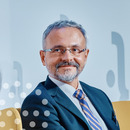Contact
Work group
Economy (Senior Fellow winter term 2023/24)
The KFG's statement on the recent investigation of Prof. Dr. Viacheslav Morozov
Viacheslav Morozov is professor of international political theory at the University of Tartu, Estonia, and academic director of the UT’s Centre for Eurasian and Russian Studies. His research interests include poststructuralist approaches in international relations, postcolonial theory and critique, ideology and discourses in Russia, and comparative aspects of post-socialist social, cultural, and economic development. He is the author of Russia’s Postcolonial Identity: A Subaltern Empire in a Eurocentric World (2015) and the editor of the Russian translation of Dipesh Chakrabarty’s Provincializing Europe (2021). His articles have appeared in International Theory, International Relations, Journal of International Relations and Development, and Cooperation and Conflict, among others.
Research Topic
Unworlding the Second World: Pro-Market Liberalism and the Story of ‘Civilisational Incompetence’
Connecting with recent discussion on “the Global East,” Viacheslav Morozov’s project questions widespread assumptions about the universality of the global liberal political and economic order which came in existence after the end of the Cold War. His previous research has shown how Russia’s political and social development has been conditioned by the country’s position in the international system. Historically, Russia has developed as a subaltern empire—a dependent entity which nevertheless has been an imperial center in its own right. The socialist experiment was an attempt to break with dependence on the capitalist core. Despite its failure, the Second World produced an enduring legacy which is often ignored in contemporary academic and societal debate. Such unworlding, driven by the false assumption of the universality of neoliberal capitalism, has contributed to growing inequality both within and between individual countries and to the spread of neoliberal ideologies that justify inequality and discrimination as the result of the “civilizational incompetence” of the masses. The project aims to offer a systematic critique of such views and, in doing so, to contribute to a better understanding of the ongoing specificity of the Second World.
Image Rights: Martin Dremljuga


